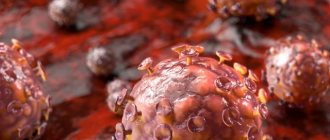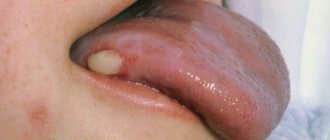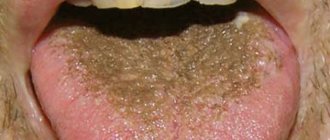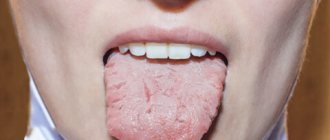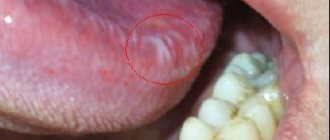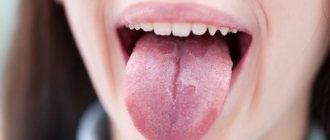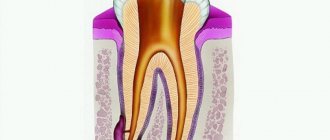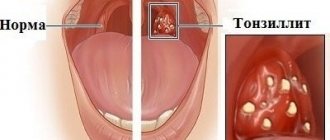There are many factors that can change the normal color and texture of the tongue. When your tongue begins to peel, it may be a sign of poor overall and oral health. People usually talk about this phenomenon when they observe white films peeling off the surface of the tongue. Let's start with the conditions under which this happens.
Causes
Hot food and drinks
One of the most common causes is a burn while eating. If you eat foods that are too hot, blisters may form on the inside of your cheeks, gums, palate, and tongue. Before these blisters heal, they often burst and consequently lead to peeling of areas of the tongue and mouth as a whole.
These blisters usually heal within a few days, but sometimes persist for a long time. They can make swallowing and eating in general very difficult.
Sour and spicy foods
The second reason why your tongue may peel is from eating very sour or spicy foods. These foods include some fruits, spicy tomato chili sauces and salsas, and carbonated soft drinks. If you continue to eat such foods frequently, the degree of tongue peeling may increase.
Geographic language
Geographic Tongue
Geographic tongue is another likely cause. This is a condition in which smooth, bright red spots appear on the top or sides of the tongue, surrounded by a whitish rim of sloughing epithelial cells (superficial mucosal cells).
The main cause of the occurrence has not yet been precisely established by doctors, but most likely it is related to heredity. People who have this pathology also have a higher risk of encountering problems such as cracked tongue.
Initially, small whitish-gray areas appear on the surface of the tongue (up to 5 mm), after which swelling and protrusion occur in their central part with further desquamation of the epithelium and papillae. As a result, an area of underlying mucosal tissue that is bright red or bright pink is exposed. Areas of peeling quickly increase, flaps of tissue are located along the rim of the spots. Such lesions can appear on any side of the tongue, for example, on the sides, on top and even on the back, which gives the tongue the appearance of a geographical map.
Moreover, people with geographic tongue, if they like to take hot, spicy, spicy food and drinks, are likely to suffer more from effects such as mucous peeling. This is due to the fact that such foods increase the sensitivity of the tongue.
Peeling of the mucous membrane of the tongue during sexually transmitted infections
STDs (sexually transmitted diseases) are diseases that can be transmitted from one person to another during sexual intercourse. It is important to note that the infections that cause these diseases can be transmitted through anal, vaginal and oral sex. The consequences of STDs can be either minor and visible only to a doctor, or major, leading to infertility or even death.
Also, some medications used to treat these infections can cause the lining of the tongue to peel off. In addition, with some STDs, the tongue becomes peeling, and this is one of the symptoms of the disease.
Medications
The use of certain medications can cause peeling of the tongue mucosa. This depends on the group of medications and duration of use.
Below are a number of medications that can cause your tongue to peel.
- Anti-inflammatory drugs are first on the list in importance. These medications may cause red spots and thinning of the lining of the tongue. Therefore, both adults and children who take these drugs for several years have a very high risk of mucosal peeling.
- Antibiotics are second in importance. These drugs can cause peeling of the mucous membrane of the tongue within two to three days from the start of use. This phenomenon may persist for a period of two to three weeks even after stopping their use.
- Diuretics – There are diuretics that cause changes in the normal coating of the tongue. When diuretics are taken for many years, they can cause the tongue to peel.
- Cancer drugs are another group of drugs with antitumor activity. This group of medications causes the formation of a thick (brown to black) dry plaque that may flake off after some time.
- Steroids – When using this group of drugs, the tongue may become red and the surface lining of the tongue may peel off.
- Bronchodilators (drugs that relax the bronchi and are used to treat asthma) cause the tip of the tongue to become red and increase the risk of the tongue becoming loose.
White coating on tongue peeling off
“White coating on the tongue usually occurs due to the colonization of bacteria, as well as fungi (of the genus Candida), and this is due to the accumulation of dead cells on its surface” [askthedoctor.com]. Such plaque can develop due to pathologies of the respiratory tract and ENT organs, dry mouth, poor oral hygiene, nutritional deficiencies, stomach diseases, general diseases such as diabetes, fever, etc. White plaque can also appear due to physical/chemical trauma, but it is usually very painful.
Typically, this plaque can be easily removed with a brush and gentle brushing of the tongue. A white coating similar to cottage cheese (curd coating) can also occur due to yeast (fungi, candida) and is usually accompanied by burning, redness and the appearance of white flaking patches of mucous membrane.
Causes of white plaque
Flaky white coating on the tongue
Most often, a flaking “white coating” appears for the following reasons:
- poor oral hygiene;
- dry mouth;
- congenital heart defects in adults;
- smoking tobacco products, chewing tobacco;
- alcohol consumption;
- mechanical irritation from sharp edges of teeth, dentures, braces, etc.
Some other conditions also cause white spots and other discoloration of the tongue. Most common with certain medications (long-term use of antibiotics), oral thrush, geographic tongue, leukoplakia, oral lichen planus, cancer of the mouth and/or tongue, and STDs (eg, AIDS/HIV and syphilis).
The above causes of white tongue can cause changes in anyone, including young children and the very elderly. The problem of white coating on the tongue may be accompanied by other symptoms such as bad breath, sores, spots. In some cases, the plaque can be so dense that it can be difficult to remove.
Diagnosis of geographic tongue
As mentioned above, the diagnosis of desquamative glossitis of the tongue is not difficult and may well be based on a visual examination of the oral mucosa. Diagnosis of desquamative glossitis is aimed at identifying the answer to the question - why the tongue may peel off, and is carried out in several ways:
The first thing that is necessary for a correct diagnosis of the pathology is an examination of the mucous membrane of the tongue to identify characteristic whitish spots and grooves, and a consultation with a dentist.- A very important place in the diagnosis of desquamative glossitis is occupied by interviewing the patient - his complaints of discomfort, itching and burning in the tongue area. Of course, when diagnosing the disease in young children, this point can be skipped.
- All diseases in the medical history of each individual person must be taken into account.
- If desquamative glossitis is suspected, general blood, stool and urine tests, as well as all other necessary laboratory tests, must be taken.
Tongue peels during pregnancy
You're pregnant and your tongue is peeling. What could be the problem? Below is how you can solve this problem.
While pregnant, some women sometimes develop a “blue tongue.” This staining may intensify after a while, and the tongue begins to peel off. This condition can develop due to nutritional deficiencies. In this case, it is necessary to urgently undergo a dental examination. Also, the problem of “blue tongue” can be associated with bloating, sleep disturbances, probably due to anxiety and certain eating habits.
Additionally, tongue peeling during pregnancy can sometimes occur due to an imbalance in thyroid hormone levels. If this is the case, then you need to seek help from an endocrinologist.
It is also important to note that some of the reasons that have already been discussed above can lead to peeling of the tongue mucosa during pregnancy.
What to do if your tongue peels off?
If you notice signs of peeling of the tongue mucosa, please simply consult a doctor. Your doctor will give you the right treatment before your symptoms become serious. A list of essential medications that your physician or dentist may recommend includes:
- Anti-inflammatory drugs.
- Supplements containing zinc.
- Anesthetics for mouth rinsing.
- Corticosteroids that are applied directly to the tongue.
- Over-the-counter pain relievers.
In order to speed up healing and get rid of peeling of the tongue mucosa, you should avoid or limit:
- the use of tobacco and medications, which can cause the tongue to peel off;
- consumption of hot, spicy, sour foods, dried and salted nuts;
- using toothpaste with added whitening ingredients or strong flavors.
Congenital fissures
It happens that a patient has cracks in the tongue since birth or childhood, which practically do not cause him any concern. Such cracks are usually transverse and are caused by the development and formation of the tongue.
Some patients have a so-called folded tongue, a congenital feature of tongue development. It is usually considered normal and does not require any treatment. The exception is red cracks in the tongue, which form at the bottom of the folds and cause pain to the patient. This happens with insufficient oral hygiene, so those with a folded tongue must carefully clean not only their teeth and gums, but also their tongue from plaque. If the owner of a folded tongue has developed cracks, treatment should be prescribed by a competent doctor, taking into account the design features of the patient’s tongue. To prevent the formation of folds in the depths, more attention should be paid to the sanitation of the oral cavity.
Home Remedies
Apart from the medications prescribed by your doctor, there are some home remedies that can be successfully used to solve the problems associated with tongue peeling.
Salt
Salt may be the best remedy for a white coated tongue. Its rough texture can act as a natural scraper to remove dirt and dead cells. Another important fact about salt is that it has antiseptic properties that will help kill the bacteria that causes bad breath.
Options for using salt to remove white plaque:
- First, you need to sprinkle some salt on your white coated tongue and gently rub (scrub) it with a toothbrush for a few minutes. After this, rinse thoroughly with warm water. To achieve good results, this process must be repeated three times a day.
- Another method that may be useful is to stir one teaspoon of salt in a glass of warm water. Rinse your mouth thoroughly with salt water and then spit it out. This procedure must be repeated several times a day until the condition improves.
Probiotics
Using probiotics is another good way to treat a white coated tongue, especially if it is caused by Candida. The ingredients in these medications, such as acidophilus and lactic acid bacteria cultures, actually help in inhibiting the growth of bacteria and fungi in the mouth.
How are probiotics used?
The powder of one probiotic capsule is mixed with a small amount of water. Then after you have brushed your teeth, you need to rinse your mouth with this solution. This should be done at least once a day for one week. In addition, yoghurts with live bacterial cultures can be successfully included in the diet.
Uses of vegetable glycerin
Another very important home remedy for tongue peeling is the use of vegetable glycerin. It is especially successful in using it in cases where the mucous membrane of the tongue, covered with a white coating, peels off. Its use is even more effective if you have dry mouth.
To use this remedy, you need to apply some vegetable glycerin to your tongue and gently brush it with a toothbrush. When finished, rinse your mouth with warm water. This procedure must be repeated until the tongue acquires its natural pink color.
Other Home Remedies
Other home remedies that can help solve the problem of tongue peeling include:
- vegetable oils;
- hydrogen peroxide;
- Aloe Vera juice.
Treatment
The main question that worries patients with glossalgia is how to cure cracks in the tongue. In fact, everything is not so difficult. The treatment method depends on the cause of glossalgia.
- First, it is necessary to eliminate the dental causes of tongue cracks - correct an incorrect bite, replace defective fillings, and adjust the prosthesis. Next, the patient should be carefully examined by a therapist, neurologist, and, if necessary, by an endocrinologist and gastroenterologist. And only after this should treatment for glossalgia be prescribed.
- Typically, treatment for fissures consists of drug therapy and physiotherapeutic procedures. Treatment with medications is to improve blood circulation in the tissues of the oral cavity, as well as to improve general cerebral circulation. For this purpose, drugs such as trental, cavinton, nicotinic acid, and vitamin C are prescribed.
- The tone of the autonomic nervous system should also be improved; for this purpose, sedatives are prescribed - tincture of valerian, motherwort, persen.
- Additionally, the doctor may prescribe procedures such as hirudotherapy or electrical neurostimulation using a TENS device. A good effect is achieved by using electrophoresis, as well as iontophoresis of novocaine.
- If the tongue is severely painful, the doctor may prescribe local painkillers - lidocaine, dicaine.
- If the patient has cracks in the tongue, plaque and burning, it is necessary to adjust the diet. During treatment, you should completely exclude from the diet foods that irritate the surface of the tongue - such as sour juices, vegetables, pickles and marinades. You should not consume large amounts of spices, especially pepper and salt. It is advisable to quit smoking.
- After each meal, be sure to brush your teeth and rinse your mouth with salted water or a decoction of medicinal herbs. Oak bark, sage, propolis, and honey have a healing effect.
Tongue color and general health
Do you have time to stick out your tongue and check its condition? Let's now look at how the condition of your tongue can reveal a picture of your health. We are going to look at the coloration, texture and possible coating on the tongue.
Tongue color
A child's tongue peels due to irritation, which could be caused by various reasons.
Do you know what the color of a healthy person's tongue is? Normally, the tongue is pink in color and has no plaque or tooth marks.
Below are options for changing the color of your tongue and what they can tell you about your health.
Pale – If your tongue and/or mucous membranes are a pale pink hue, this may be a sign that there is not enough hemoglobin in your blood. In this case, the person may suffer from weakness and fatigue. Make sure your diet contains iron-rich foods and consult a doctor.
Bright red - when the color of the tongue is this, it is a clear sign of a lack of iron and B vitamins. Be sure to consult a gastroenterologist and dentist. It is also important to choose the right diet and make sure that her diet is rich in nutrients.
A purple or violet tongue color may mean that you are suffering from high cholesterol. This problem, if not taken care of as soon as possible, can result in serious heart disease. A purple tongue can also occur with diseases of the respiratory system and indicate a constant lack of oxygen.
Tongue texture
Dry Tongue – When your salivary glands become swollen and poorly functioning, it can lead to a dry tongue by reducing saliva production. This condition is often caused by stress. Therefore, a good remedy for this is to find enough time for rest. Again, you need to visit a doctor who will prescribe medications that stimulate saliva production.
Raised red spots – If the tip of your tongue turns red, which may be accompanied by bleeding, you may be deficient in vitamin C. Taking extra vitamin C (in food or supplements) helps strengthen the tiny blood capillaries deep inside the tongue.
Causes of desquamative glossitis
To date, the final causes of desquamative glossitis have not yet been fully identified and it has not been established why an adult’s tongue peels off. But experts identify a number of factors that have the most direct impact on the development of the disease:
If your tongue is peeling, the reasons may be related to vitamin deficiency. One of the main reasons for the development of pathology is considered to be a failure in vitamin metabolism - most often we are talking about metabolic disorders of B vitamins. Such failures are accompanied by digestive and nervous system disorders, increased dryness and irritability of the skin, and disturbances in the process of hematopoiesis. Also, disruptions in vitamin metabolism are characterized by bleeding gums and inflammatory changes in the oral mucosa.- Common causes of desquamative glossitis in children and adults include various diseases of the gastrointestinal tract. Among such diseases are gastritis, gastric and duodenal ulcers, gastroduodenitis, malabsorption syndrome (pathology in the normal process of transporting and digesting food in the small intestine).
- Hepatitis and other pathological conditions of the liver are a common reason why an adult’s tongue may peel off.
- Various diseases of the endocrine system and pancreas - diabetes, acute and chronic pancreatitis.
- The presence of neoplasms of a benign or malignant nature.
- Autoimmune diseases (rheumatoid arthritis, systemic lupus erythematosus, multiple sclerosis).
If a child’s tongue peels, this may be due to vitamin deficiency or long-term use of certain medications.
In addition, if parents notice that the baby’s tongue is peeling, this may be a reaction of the child’s body to vaccinations.
Also in children, the appearance of desquamative glossitis often acts as a reaction of the body to helminthic infestations, a manifestation of colitis and enterocolitis. Pathological changes in the mucous surface of the oral cavity in girls may be associated with puberty, or more precisely, with a hormonal imbalance in the child’s body.
